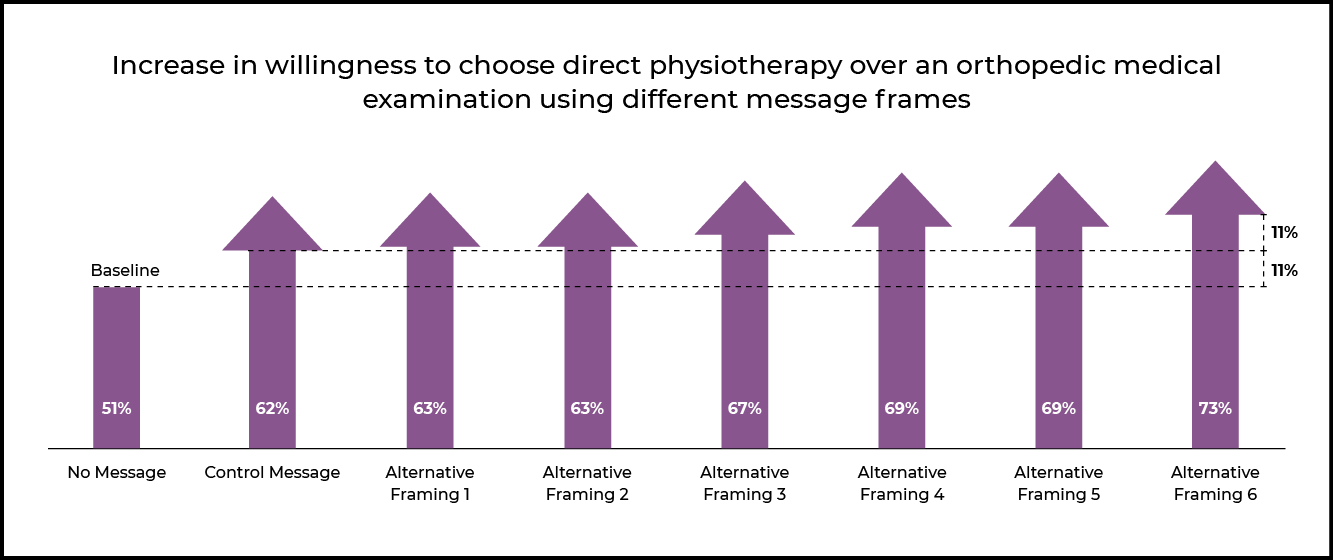Encouraging patients to make use of direct access to physiotherapy
Patients suffering from musculoskeletal pains prefer to visit an orthopedic doctor to begin treatment, although in many cases a physiotherapist can provide faster and more affordable care.
A preference to see a doctor leads to extended waiting periods for appointments, delayed treatments and hassle for patients, as well as a financial strain on Health Maintenance Organizations (HMOs). Aurora collaborated with Maccabi Healthcare Services, one of Israel’s leading HMOs to encourage its members to use physiotherapy services directly, without seeing a doctor first.

Background
Physiotherapy is considered one of the most recommended non-surgical treatments for musculoskeletal pains and disorders. In Israel, patients suffering from musculoskeletal strains and syndromes tend to first consult a medical doctor. Often these consultations are unnecessary and result with a referral to a physiotherapist. This inefficient, wasteful tendency puts a heavy strain on Health Maintenance Organizations (HMOs) and patients alike, with a rising demand for doctor appointments, extended waiting periods, the nuisance of attending unnecessary appointments, and overdue physiotherapy treatments.
Our goal
We teamed up with Maccabi Healthcare Services, one of Israel’s leading HMOs and calculated that if approximately 50% of their patients who attended physiotherapy after seeing an orthopedic doctor would have seen a physiotherapist directly instead, they could save some 20,000 unnecessary doctor appointments annually, and save the HMO approximately 8 million shekels annually.
As an intervention, we designed new features for the HMO’s website and mobile app to offer patients a direct access option to physiotherapy when they attempt to schedule a medical appointment.
Applying behavioral insights, we aimed to further increase the response rate to an online offer made by the HMO to patients who are trying to schedule an orthopedist appointment. Namely, to schedule an earlier visit to a physiotherapist.
How did we do this?
We used quantitative and qualitative methods to recognize psychological and behavioral barriers of patients in key decision points in their patient journeys, which prevented them from choosing physiotherapy. We conducted interviews, usability testing, and online surveys to examine how patients go about scheduling appointments, and what motivated their choice.
We then tested how presenting different framings of the offer to skip an orthopedist appointment and schedule an earlier physiotherapy treatment influence the willingness of patients to do so. This was done using a randomized controlled trial (RCT), comparing between the HMO’s current offer and six other options, each giving answer to the psychological barriers we discovered in our initial research.
What did we find?
To the HMO’s surprise, we discovered that 77% of its surveyed members weren’t even aware of the direct physiotherapy option, and only 9% have ever used it. Awareness is a prerequisite for behavioral change, and our finding proved to be crucial in encouraging people to choose physiotherapy. We found that by simply letting people know about the existence of direct access to physiotherapy, more than 50% would be willing to use it.
In addition, we learnt that the way members were presented with the offer to schedule an earlier physiotherapist appointment, instead of their intended orthopedist appointment, needed to be tailored to psychological and behavioral barriers relating to physiotherapy. Our RCT showed that reframing the offer could increase the willingness by up to 11% compared to the original message, and by up to 22% when no attempts to address the benefits of physiotherapy were made.
How did we use it?
We provided our partner with a detailed ‘patient journey’ map, with practical measures to encourage their members to use direct physiotherapy in every step of the way. These included UX modifications of digital platforms, along with materials for a campaign aimed to modify the perceptions about physiotherapy as a leading treatment for musculoskeletal pains.
Over the long run, and with over 500,000 of the HMO’s members seeking care for musculoskeletal problems annually, encouraging people to use direct physiotherapy can potentially save over 300,000 doctor appointments and tens of millions of shekels for the HMO.

